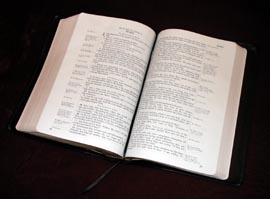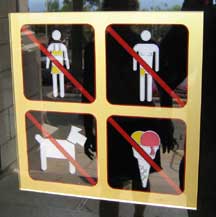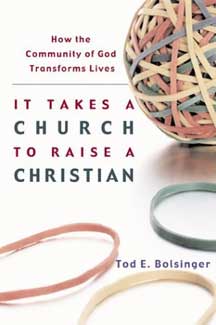| |
Blogging on Worship:
A Collection of Blog Posts on Worship
by Rev. Dr. Mark D. Roberts
Copyright © 2004 by Mark D. Roberts
Note: You may download this resource at no cost, for personal use or for use in a Christian ministry, as long as you are not publishing it for sale. All I ask is that you give credit where credit is due. For all other uses, please contact me at mark@markdroberts.com . Thank you.
Noises that Drive Me Crazy
Posted at 11:10 p.m. on Friday, January 30, 2004
Have you ever been on a plane, sitting only a few feet away from a crying baby who refuses to be comforted? At first you feel bothered, then angry, then frantic. If the crying persists, you're well on your way to stark raving mad. You start looking at the emergency exits with longing, wondering about your odds of surviving a jump from 30,000 feet.
I'm afraid Ronald Duffy went over the edge this week. The thirty-five-year-old American was flying to Brazil to meet his girlfriend, when he found himself trapped only feet away from a squalling baby. Duffy didn't jump from the plane, however. After the crying continued, this poor soul decided to remedy the situation. He asked a flight attendant for a cup of water, which he promptly poured all over the crying infant. See what I mean? Stark raving mad!
At first the passengers seated around Duffy almost killed him. Then, arriving in Brazil, he was promptly arrested, to the cheers of his fellow flyers. "I think I overreacted a little," Duffy explained to a Brazilian newspaper. No kidding!
Though I'd never condone the dousing of crying babies with water, I can understand Duffy's frustration. Nothing drives me crazy like the endless howling of an infant with whom I'm trapped for hours. Well, except perhaps for the ringing of cell phones in church.
I can't tell you how many times I've been preaching up a storm when I hear the haunting sounds of the Nokia cell phone ditty. It happens occasionally on Sunday morning, but especially during special midweek services. Once during a memorial service cell phones went off six different times. Enough racket to raise the dead. Well, not really.
My church now prints a prominent plea at the head of our worship bulletin: "Please silence your pagers and cell phones for the duration of the service." This has made matters better, but not perfect. I wonder if the time is coming when our standard call to worship will be something like this: "The Lord is in his holy temple. Let all the earth keep silence before him. And that means turning off your cell phones and pagers . . . now! Amen!"
If this doesn't work, maybe I'll hire Ronald Duffy to prowl the aisles of our sanctuary, cup of cold water in hand, ready to baptize anyone whose phone interrupts our worship. This might motivate folks to silence their noisemakers. But, whatever I do, I won't let Duffy go anywhere near the church nursery.
If you go to church this weekend, do me a favor: Turn off your phone! |
 |
| |
|
Home
Soulful Silence
Posted at 9:15 p.m. on Saturday, January 31, 2004
In yesterday's post I ranted about noises that drive me crazy. Though I'd never imitate Ronald Duffy by dumping a cup of water on a crying baby in a plane, I can feel Mr. Duffy's pain. And when a ringing cell phone interrupts my worship, I realize just how much my outer and inner world is polluted by noise.
Noise. It's everywhere. In my local Tully's Coffee the Muzak purrs, the espresso grinder whirls, brewing timers chirp, and cell phones sing incessantly. Even when I'm far out in the High Sierra wilderness I'm haunted by the distant roar of high flying jet planes.
But relentless noise isn't only "out there," but also "in here." My own soul echoes with the din of my crazy life. I hear the nagging cries of my to do list, the multitude of voices demanding my attention, and the shouts of my own fears. With so much racket both "out there" and "in here," how will I ever be able to hear the "still, small voice" of God, who often speaks with the "sound of a gentle whisper" (1 Kings 19:12, NLT)?
Perhaps the gathering of God's people for worship will provide a moment of quiet for my soul, at least when cell phones aren't ringing. Perhaps, but perhaps not. So much of our worship today is loud, joyfully loud, gloriously loud, even appropriately loud. Bands blast and organs bellow. This is all well and good. After all, we're supposed to make a joyful noise to the Lord (Psalm 100:1), to shout and clap to God "with loud songs of joy" (Psalm 47:1, NRSV).
But have we forgotten another dimension of biblical worship, the dimension of quiet reverence and silent waiting upon God? The Old Testament prophet Habakkuk exhorts us, "The LORD is in his holy temple; let all the earth keep silence before him!" (Hab 2:20). And the Psalmist adds, "For God alone my soul waits in silence; from him comes my salvation" (Ps 62:1). Could it be that at least a few moments of our corporate gatherings should be intentionally quiet? By filling every square inch of worship with noise - even joyful noise - are we obscuring the voice of God and depriving our souls of the silence they so desperately need?
When we consider the majesty of God, there will be times when we'll break forth in joyful, boisterous, earsplitting praise. But there ought to be other times as well, times when we hear and obey God's invitation in Psalm 46: "Be silent, and know that I am God!" (v. 10, NLT).
Even in the midst of celebrative worship, even on Super Bowl Sunday, may the Lord grant you a few moments of soulful silence, a few moments to be silent and know that he is God!
Home
What is Ash Wednesday?
Posted at 10:40 p.m. on Tuesday, February 24, 2004
For months I've heard evangelical Christians mention Ash Wednesday, almost always in the sentence: "The Passion of the Christ is being released on Ash Wednesday." I find this ironic because, until recently, most evangelical Christians never mentioned Ash Wednesday or gave it a second thought. But now, thanks to the effort of the Roman Catholic Mel Gibson, all of a sudden we're talking about Ash Wednesday as if it were an old friend.
I grew up with only a vague notion of Ash Wednesday. To me it was some Catholic holy day that I, as an evangelical Protestant, didn't have to worry about. During the spring of my first year of college, I was startled to see a woman who worked in my dining hall with a dark cross on her forehead. At first I wondered if it were a bizarre bruise. But then it dawned on me what I was seeing. Here was my introduction to Ash Wednesday piety. I felt impressed that this woman was willing to wear her ashes so publicly, even though it seemed rather odd to me. And, let me assure you, it never dawned on me that this would be something I might do myself.
Fast forward sixteen years. During my first year as Senior Pastor of Irvine Presbyterian Church I learned that this church had a tradition of celebrating Ash Wednesday with a special worship service. It included the "imposition of ashes" on the foreheads of worshippers. I, as the pastor, was expected to be one of the chief imposers! So I decided it was time to learn about the meaning of Ash Wednesday. I wanted to be sure that the theological underpinnings of such a practice were biblically solid, and that it was something in which I could freely participate.
Ash Wednesday is a Christian holiday (holy day) that is not a biblical requirement (rather like Christmas). Nevertheless, it has been honored by Christians for well over ten centuries at the beginning of Lent, a six-week season of preparation for Easter. (I'll say more about Lent in my next post.) In the earliest centuries, Christians who had fallen into persistent sin had ashes sprinkled on their bodies as a sign of repentance, even as Job repented "in dust and ashes" (Job 42:6). Around the tenth century, all believers began to signify their need for repentance by having ashes placed on their foreheads in the shape of a cross. Even this sign of sinfulness hinted at the good news yet to come through its shape.
Today, celebrations of Ash Wednesday vary among churches that recognize this holiday. In my church ashes are placed on our foreheads as a reminder of our mortality and sinfulness. The person who imposes the ashes quotes what God once said to Adam after he had sinned: "You are dust, and to dust you shall return" (Gen 3:19). This is the bad news of our sinfulness that prepares us to receive the good news of forgiveness in Christ.
What I value most about our Ash Wednesday worship is the chance for me and my congregation to acknowledge together our frailty and sinfulness. In a world that often expects us to be perfect, we can freely confess our imperfections. We can let down our pretenses and be truly honest with each other about who we are. We all bear the mark of sin, from the youngest babies to the oldest seniors. We all stand guilty before a holy God. We all are mortal and will someday experience bodily death. Thus we all need a Savior.
Perhaps one of the greatest benefits of Ash Wednesday is that it begins the season of Lent. This is also a foreign concept for many evangelical Christians. So in my next post I'll explain the meaning and practice of Lent, and why this can enrich your experience of God's grace in Christ.
What is Lent?
Posted at 10:00 p.m. on Ash Wednesday, February 25, 2004
Growing up as an evangelical Christian, I experienced Lent as little more than a joke. "What are you giving up for Lent?" my friends would ask. "Homework," I'd say with a smirk, or "Obeying my parents." Lent was one of those peculiar practices demanded of Roman Catholics - another great reason to be Protestant, I figured.
In the last fifteen years I've discovered that Lent is in fact recognized by millions of Protestant Christians, in addition to Catholic and Orthodox believers. Lent (the word comes from the Middle English word for "spring") is a six-week season in the Christian year prior to Easter. In the ancient church it was a time for new converts to be instructed for baptism, and for believers caught in sin to focus on repentance. In time, all Christians came to see Lent as a season to be reminded of their need for penitence and to prepare spiritually for the celebration of Easter. Part of this preparation involved the Lenten "fast," giving up something special during the six weeks of Lent (but not on Sundays, in some traditions).
Many Protestants rejected the practice of Lent, pointing out, truly, that it was nowhere required in Scripture. They also wanted to avoid some of the excessive aspects of Catholic penitence that tended to obscure the gospel of grace. In time, Protestants saw Lent, at best, as something completely optional for believers, and, at worst, as a superfluous Catholic practice that true believers should avoid altogether.
Some segments of Protestantism did continue to recognize a season of preparation for Easter, however. Here the emphasis was not so much on penitence and fasting as on intentional devotion to God. Protestant churches sometimes added special Lenten Bible studies or prayer meetings so that their members would be primed for a deeper experience of Good Friday and Easter. Lent was a season to do something extra for God, not to give something up.
After ignoring Lent for the majority of my life, I've paid more attention to it during the last decade. Sometimes I've given up something (like watching television or eating sweets) in order to devote more time to Bible study and prayer. Sometimes I've added extra devotional reading to my regular spiritual disciplines. I can't claim to have had any mystical experiences during Lent, but I have found that it helps me to appreciate more deeply the meaning of the cross and the victory of the resurrection. Before I began honoring Lent, Good Friday and Easter always seemed to rush by before I could give them the attention they deserved. Now I find myself much readier to meditate upon the depth of Christ's sacrifice and to celebrate his victory over sin and death on Easter.
Lent is not a requirement for Christians. But millions of us - Catholic, Orthodox, Protestant, and Independent - have found that recognizing the season of Lent enriches our worship and deepens our faith.
If you've never before taken Lent seriously, but the idea sounds intriguing, let me suggest one very simple practice that you might want to adopt.
A Simple Lenten Discipline
Read one chapter of a gospel each day during Lent. Before you begin, ask the Lord to speak to you through his Word. Read slowly and prayerfully. Let the text sink into your mind and heart. When you've finished reading, pray about whatever has touched you. If you begin with the Gospel of Mark, you'll have enough time to read it and one other gospel during Lent. |
 |
No matter how it happens, I pray that the next six weeks will be for you a time of preparation, so that you might be ready for a truer, deeper, and richer experience of God's love on Good Friday and Easter.
Thanks and Praise
Part 4 in the series “Harvard Ironies”
Posted at 10:00 p.m. on Tuesday, June 1, 2004
| The day of my graduation from college began with a baccalaureate service in Harvard’s Memorial Church. There, in a packed room, we sang barely religious hymns and heard inspiring addresses from university officials. God was surely present in this gathering, but his name was rarely mentioned.
The non-religious tone seemed to change, however, when the President of Radcliffe College addressed us. “The Baccalaureate service honors a fine tradition in this university,” she began. “It is a service of thanks and praise.”
“Wow!” I thought to myself. “So we’re actually going to acknowledge God in this service.”
“So,” the Radcliffe President continued, “in faithfulness to that tradition, I want to thank you for your outstanding efforts during these past four years and praise your for your great accomplishments!” |
|
| |
Memorial Church at Harvard |
Okay, so I was wrong. Not exactly what I had in mind when thinking of thanks and praise.
Of course it’s good to thank people for their efforts and to praise them for their accomplishments. Where I live, people are far too stingy with these sorts of affirmation. But if all we do is thank people, we’re missing the greatest and most important part of thankfulness. And if we only praise human accomplishments, we’re failing to praise the greatest achievements of all.
There are many, many reasons why giving thanks and praise to God are so important for us. I’ll mention only one in closing. When I thank God for his gifts to me, when I praise him for his all-surpassing majesty, I put myself in my place. I am rightly humbled before the grace and glory of God. Such humility is good – no, it’s essential – for my soul. Yet, at the same time, when I acknowledge God with thanks and praise I am lifted up. I am drawn closer to God. And I begin to share a bit of his glory. But, knowing whose glory it is, I’m protected from the dangers of pride.
As you live today, be sure to thank and praise the people around you who deserve it. But don’t forget, above all, to thank and praise the God who deserves it all.
Home
No Shorts Allowed!
Part 12 in the series “European Reflections”
Posted at 9:00 p.m. on Saturday, June 19, 2004
As my wife and I visited many churches throughout southern Europe, I noticed a consistent dress code. Visitors to the churches were not allowed to wear shorts (above the knees) or tank tops. Even more casual apparel (like bathing suits) was completely forbidden. Many churches had other prohibitions as well, like no flash photography, no eating, or no pets. Even though most of the visitors in these churches had come, not to worship, but simply to gaze at beautiful art, they were expected, nevertheless to act with a measure of reverence and respect for tradition.
My mind was filled with many thoughts as I considered the ecclesiastical dress code. On the one hand, I thought back to first-century Corinth, where some women had taken off their veils during Christian gatherings (in homes, not sanctuaries). Ironically, this was rather like if women were to wear mini skirts into a church meeting today. Veils, in first-century Corinth, were worn as a demonstration of modesty. An unveiled head in that day was sexually provocative. So, though styles have changed over the ages, the fundamental value of modesty is still preserved in many European churches. |
|
| |
This sign was posted on the front door of a church in Monaco. Does the bottom right image mean "no food" or "no ice cream" or "no ice cream that's dripping"?
|
This struck me as ironic, especially in churches featuring nude paintings or statues. One cannot wear shorts into the Sistine Chapel to view anatomically accurate paintings of dozens of nude men and women. Of course these nudes weren’t meant to be erotic. They reflected the Renaissance delight in humanity and the beauty of the created world.
I thought of how all of this would translate into my world, the world of Southern Californian Christianity. Now the irony multiplies. Although many churches in my part of the world would welcome people in shorts, tank tops, and other casual attire, they’d never allow a nude painting or statue. Moreover, many of those Southern Californians who come to worship so casually dressed nevertheless come with a fervent desire to offer genuine worship to the living God. Their bodies may look irreverently casual, but their hearts are often filled with genuine reverence.
Surely what’s in our hearts matters most. I’d rather worship in an spiritually-alive but overly casual Southern Californian megachurch than in an spiritually-dead European cathedral. Yet I wonder if we’ve lost something by allowing ourselves to approach God so casually. By saying (and singing) again and again, “Come, just as you are to worship,” we run the risk of minimizing the awesome holiness of the One into whose presence we come when we worship. True, we are allowed into God’s presence, not because we are dressed up, but because we are dressed in the righteousness of Christ. Yet I fear we can too easily take all of this for granted. I know I can.
 |
I’m not planning to put up a sign on my sanctuary like those I saw throughout Southern Europe. Indeed, I want to welcome all who would come into worship at Irvine Presbyterian Church, even if they may be underdressed. Ironically, I saw more bare midriffs in church on Easter than on any other Sunday, presumably because some of our guests didn't think twice about coming to church in such casual and even provocative attire. But I've got to tell you, I'm glad they were there. Nevertheless I hope that my church members, no matter how they dress, will come to worship with a sense of eagerness and reverence. If dressing up a bit helps them to be mentally and emotionally prepared for worship, then by all means they should dress up.
And, please, no dripping ice cream in the sanctuary!
Home |
A picture of the inside of the sanctuary at Irvine Presbyterian Church, sans ice cream drips. |
|
|








